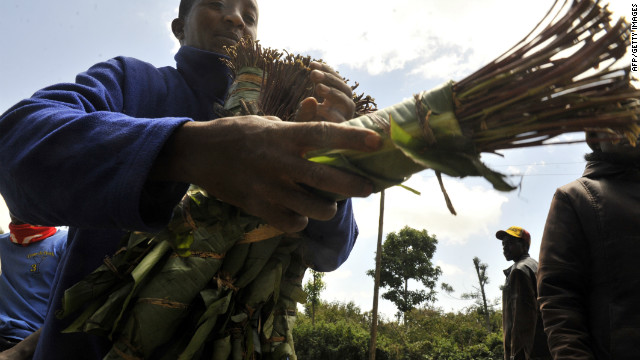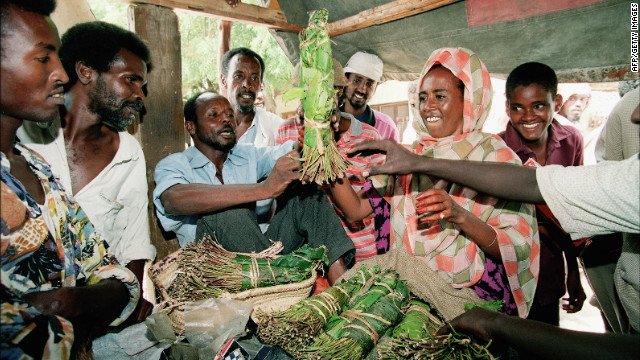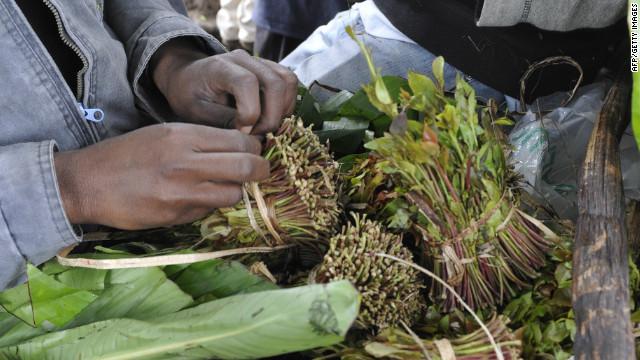(Sources: Chatham House and CNN)
"If the ban is accepted or if it is enforced, the whole
Meru county, the economy of the Meru county will be crippled," says Kenyan
khat farmer Edw
ard Mutuura, who exports the majority of his crops to the
Nertherlands. "The economy of the population here where khat is grown will
be totally crippled and people will have no source of income," he adds.
Read also: Agriculture's 'critical role' in Africa's future
The Dutch government cited health concerns as well as social
and economic reasons for the p
rohibition of khat. According to the U.S. Drug Enforcement Administration, khat can induce manic behaviors, hyperactivity and hallucinations while chronic abuse can result in symptoms such as physical exhaustion, violence and suicidal depression.
rohibition of khat. According to the U.S. Drug Enforcement Administration, khat can induce manic behaviors, hyperactivity and hallucinations while chronic abuse can result in symptoms such as physical exhaustion, violence and suicidal depression.
However, some observers believe that the ban, which is
expected to start later this year, has been imposed after suggestions of
purported l
inks between the international khat trade and the funding of
terrorist groups like Al Shabaab -- a claim Dutch officials deny.
"There are legitimate businesses whose end product may
end up in the hands of Al Shabaab, yet if governments resort to banning these
businesses then it hurts the ultimate owners of these businesses," says
analyst Emmanuel Kisiangani of the Institute of Security Studies.
"I think it is a tricky situation, it is a precarious
balancing act -- governments need to think of mechanisms that ensure that these
legitimate businesses don't end up benefiting these terrorist
organizations."
Al-Shabaab, a militant Islamist group that controls much of
southern Somalia and is active around the capital Mogadishu, has been battling
the country's weak transitional government for years.
Read also: Somali women defy danger to write basketball
history
A recent U.N. report said the terrorist group, which has
connections to al Qaeda, gets funds by taxing the khat exported to Somalia.
Analysts believe that the khat trade in Europe may be
following a similar pattern. They say some of the businessmen in Europe who act
as middlemen to khat exporters and farmers could be sending the money back to
Al Shabaab.
"So, ultimately, the contributors are doing this in
good faith but the end result is that you have people with wrong motives along
and in between who take these resources, this money, and channel it to terror
organizations," says Kisiangani.
Somalia analysts Jessica Lincoln and Frans Barnard say the
use of international khat trade to fund militant activities has long been
suspected by intelligence agencies but evidence is difficult to prove and
remains circumstantial.
Governments need to think of mechanisms that ensure that
these legitimate businesses don't end up benefiting these terrorist
organizations
Emmanuel Kisiangani, ISS
They note that the Dutch ban has been driven by health,
socio-economic and local political factors, along with a tougher stance on
"softer" drugs, but add that this needs to be balanced against the
security context of Somalia and the increasing prominence of Al Shabaab in
recent years.
 "This is of course a huge concern for the international
community in their anti-terrorist operations so any suggested links to the
funding of terrorist activities will demand movement for cessation of such
activities or pressure to regulate," says Lincoln of Rubicon Resolution.
"This is of course a huge concern for the international
community in their anti-terrorist operations so any suggested links to the
funding of terrorist activities will demand movement for cessation of such
activities or pressure to regulate," says Lincoln of Rubicon Resolution.
Olle Schmidt, a Swedish member of the European parliament
who's been raising the issue of the drug's detrimental social and health
effects for many years, says that several security services have admitted that
there might be a link between Al Shabaab and illegal khat trade but it is very
difficult to track the cash generated by the trade and ultimately know who the
end receivers are.
"They can follow the money to Dubai and then further
into Somalia but then they really don't know," he says.
In the UK, anti-khat campaigner Abukar Awale says that Al
Shabaab targets vulnerable young addicts in the British-Somali community for
recruitment. He says that parts of the multimillion dollar khat trade is being
controlled by people "who are very sympathetic to Al Shabaab" and
calls on the UK government to follow the Netherlands' example and ban the drug.
The economy of the population here where khat is grown will
be totally crippled and people will have no source of income.
Edward Mutuura, farmer
 "In my opinion, by allowing khat to be legal, Britain
is providing tools, manpower and resources to Al Shabaab," he says.
"In my opinion, by allowing khat to be legal, Britain
is providing tools, manpower and resources to Al Shabaab," he says.
But back in Meru county, the khat farmers who are separated
from the end user and any regulation further down the chain say that banning
khat could kill off the region's economic future.
"Khat farming is the heart of the economy of this
place," says Mutuura. "We cannot educate our children without khat --
if we don't have khat to sell, this means our economy is grounded."
With the Kenyan government having entered talks with the
Dutch government to reverse the ban on khat, the farmers hope the talks will
bear fruit or their livelihood will be plucked away.
"This is only what we know in our life, nothing
more," says Mutuura.
http://edition.cnn.com
http://edition.cnn.com



No comments:
Post a Comment